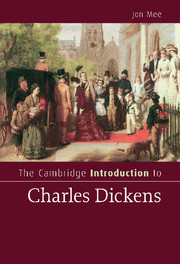Book contents
- Frontmatter
- Contents
- List of illustrations
- Preface
- Chronology
- List of abbreviations
- 1 Dickens the entertainer: ‘People must be amuthed’
- 2 Dickens and language: ‘What I meantersay’
- 3 Dickens and the city: ‘Animate London … inanimate London’
- 4 Dickens, gender, and domesticity: ‘Be it ever … so ghastly … there's no place like it’
- 5 Adapting Dickens: ‘He do the police in different voices’
- Afterword: Dickens's world
- Notes
- Further reading
- Index
- Cambridge Introductions to …
1 - Dickens the entertainer: ‘People must be amuthed’
Published online by Cambridge University Press: 05 August 2012
- Frontmatter
- Contents
- List of illustrations
- Preface
- Chronology
- List of abbreviations
- 1 Dickens the entertainer: ‘People must be amuthed’
- 2 Dickens and language: ‘What I meantersay’
- 3 Dickens and the city: ‘Animate London … inanimate London’
- 4 Dickens, gender, and domesticity: ‘Be it ever … so ghastly … there's no place like it’
- 5 Adapting Dickens: ‘He do the police in different voices’
- Afterword: Dickens's world
- Notes
- Further reading
- Index
- Cambridge Introductions to …
Summary
Charles Dickens was born in Portsmouth on 7 February 1812, into a world and into a family offering him little security. His mother was Elizabeth Dickens, née Barrow, the daughter of a naval paymaster found guilty of embezzling money from his employer two years before Charles was born. His father, John, was a clerk in the Navy Pay Office, originally in London but moved to be near Portsmouth's naval dockyard in 1810. Dickens was the second child born into a household that never stayed anywhere for very long. He never felt he had received the support and succour he deserved from either of his parents. Rapid transitions and stark contrasts were as much a part of his childhood as they are fundamental to his novels. In his early childhood, a series of different residences in Portsmouth was followed by removal back to London in 1814 when the Admiralty reorganized at the end of the Napoleonic War. This was the earliest contact with London for a novelist whose love and loathing for the great expanding metropolis was to define his fiction for many of his readers.
Initially at least, it was a relatively short-lived encounter between a writer and his inspiration, for only two years later the family then moved to be near the naval dockyards in Kent. Dickens memorably described this flat coastal landscape of indeterminate land and sea at the beginning of Great Expectations, when the soldiery hunt down the escaped convict Abel Magwitch across its dreary wastes.
- Type
- Chapter
- Information
- The Cambridge Introduction to Charles Dickens , pp. 1 - 19Publisher: Cambridge University PressPrint publication year: 2010



